Green Functional Materials Group
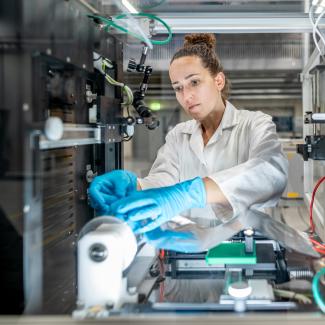
We are sustainability enthusiasts!
The “Green Functional Materials” group, led by Dr. Katja Heise, is a young (established 2023) and independent team at TUBAF and affiliated to the Institute of Nanoscale and Biobased Materials (INBM).
Our work particularly covers the early value chain of bioresources: from the isolation of biobased nanomaterials, their chemical modification and macroscopic structuring, to the application of the resulting functional materials, e.g., in membranes, sensors or biobased electronics.
You want to work or collaborate with us? Just contact Dr. Katja Heise directly (katja [dot] heise [at] esm [dot] tu-freiberg [dot] de).
News from the group also on LinkedIn: https://www.linkedin.com/in/green-functional-materials-group-937696294/
A few impressions of our work: https://1drv.ms/b/s!Ajdq0e-s9YNSgtYDF2FwbitQpVlahA?e=KQUbEx
SHK gesucht - du bist Chemikerin oder Chemiker oder studierst Angewandte Naturwissenschaften? Wir suchen ab sofort eine Hilfskraft für unser Team.
Melde dich gern bei katja [dot] heise [at] esm [dot] tu-freiberg [dot] de
Projects
Polymer membranes can do more than simple filtration! That´s exactly the motto of the BMBF junior research group “Filtrolution”. We want to produce membranes that combine a targeted separation function with reactivity, and sustainability.
In “Filtrolution”, bionanoparticle-stabilized emulsions are the design basis for sustainable and reactive membranes. Reactive components, such as catalytically active metal nanoparticles or enzymes, are bound directly to the bionanoparticles in the emulsion. The resulting microreactors are then processed into reactive membranes, where they are spun into fibers, e.g., by electrospinning. By combining the separation function and reactivity, the project achieves the integration of membranes as an active component in processes. This will be demonstrated in three applications:
1) in reactive water purification,
2) in synthetic chemistry and
3) in the storage and delivery of active pharmaceutical ingredients
Funding period: 2023 - 2027
Grant number: 03XP0517
More information: https://www.werkstofftechnologien.de/projekte/nachwuchsfoerderung/nachwuchsgruppen-ressourcenschonung/dr-katja-heise-filtrolution
ILINK is a mobility program funded by the Spanish CSIC (Consejo Superior de Investigaciones Cientificas, Espania). The aim of the project is to fabricate sustainable hydrogels from marine biomass as growth medium for primary cell culture. To precisely address the cells´ needs we monitor the hydrogel properties with sensors.
International partners:
- Coordinator: Dr. Peter Shuttleworth, Instituto de Ciencia y Tecnología de Polímeros (CSIC), Spain
- Prof. Anna Trubetskaya, NORD University, Norway
- Dr. Duncan Macquarrie, University of York, United Kingdom
- Prof. Dr. Alexa Klettner, Kiel University, Germany
- Prof. Yvonne Joseph und Dr. Katja Heise, TU Bergakademie Freiberg, Germany
Funding period: 2024-2025
Grant number: ILINK23096
The aim of Laura Hohlfeld's doctoral project is to produce sustainable materials that can combine sensor and actuator functionalities in order to use them for intelligent membranes, wound dressings and in batteries.
In order to realize the sustainability of smart materials in the intended applications, stimuli-responsive biopolymers such as nanocelluloses, nanochitin, collagen or polyamino acids should be used. A targeted nano- and micro-structuring of the bio-based matrix is achieved via electrospinning or 3D printing (“direct ink writing”). The aim is to easily create materials with structural and functional gradients and to control their properties via external stimuli.
Funding period: 01.08.2023 – 31.07.2027
Project number: 0502.0374
Further information:
https://www.esf.de/portal/DE/ESF-Plus-2021-2027/Foerderprogramme/bmbf/zukunft_der_arbeit.html
The aim of Leon Nowack's doctoral project is to produce bio-based, electrocatalytically active composite materials with precisely adjusted 3D nano- and microporosity.
The starting point for structuring are biopolymer-based hydrogels and aerogels as well as biocolloid-stabilized emulsions and foams. These are to be used for catalytic applications in the chemical industry, e.g. for the production of basic chemicals, for sensory applications in the life science sector and for the development of new concepts for energy production.
Funding period: 01.09.2023 – 31.08.2027
Project number: 0502.0373
Further information:
https://www.esf.de/portal/DE/ESF-Plus-2021-2027/Foerderprogramme/bmbf/zukunft_der_arbeit.html
Expertise and Equipment
The group has a Fluidnatek(R) LE-50 electrospinning system with environmental control unit, two independent spinning stages, different spinning heads (e.g. coaxial and multi-emitter) and different collectors. Nanofiber membranes up to A4-format are spun from aqueous or organic solutions.
Are you interested in electrospinning? Then please contact our expert Dr. Vanessa Castro directly ( vanessa [dot] oliveira-castro [at] esm [dot] tu-freiberg [dot] de (vanessa[dot]oliveira-castro[at]esm[dot]tu-freiberg[dot]de) ). We are always happy to test new, exciting materials!
More information about the electrospinning process: https://1drv.ms/b/s!Ajdq0e-s9YNSgtYCq3YkKzsJqvRA3g?e=Iq3JeY
Cellulose and chitin nanocrystals as well as cellulose nanofibers with different surface chemistry are produced using different hydrolysis processes and modification methods. Chemical modifications are carried out directly in aqueous suspensions, organic media or at liquid-liquid interfaces. We are particularly interested in the link between surface chemistry of the nanomaterials and their interfacial behavior or self-assembly.
Common characterization techniques include: IR and NMR spectroscopy, atomic force microscopy (AFM), X-ray photoelectron spectroscopy (XPS), wet chemical methods (e.g., charge titrations), dynamic light scattering (DLS)
Biopolymers and biobased nanomaterials can serve as precisely structured templates, for example, for catalytically active compounds. We use particle-stabilized emulsions and foams, aerogels or nanofiber membranes to immobilize, e.g., metal nanoparticles, metal oxides and quantum dots (QDs).
Metal nanoparticles are produced through an efficient and green microwave synthesis. The contact person for this synthesis method is Hans Lesny (hans [dot] lesny [at] esm [dot] tu-freiberg [dot] de (hans[dot]lesny[at]esm[dot]tu-freiberg[dot]de)).
Examples of biobased materials:
- Biobased reactive membranes (“Filtrolution” project) for filtration, as smart compound storage, or for catalytic applications
- From Pickering emulsions to 3D-porous foams
- Stimuli-responsive materials based on biopolymers
- Hydrogels and aerogels made from lignin, nanocelluloses and nanochitin, alginates etc., e.g., for the design of sensors
- Hydrolysis and synthesis equipment for biobased, functionalized nanomaterials
- ATR IR spectroscopy
- Titration methods for the wet chemical characterization of bionanomaterials
- Test methods for biobased membranes (more details coming soon)
You can find further methods directly at the IMBM.
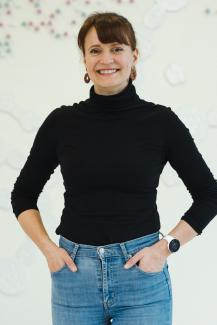
Dr. Katja Heise
Dr. Katja Heise is an expert in biopolymer chemistry and materials design. She received her PhD from TU Dresden in 2017 working on the fabrication of lignocellulose-based hydrogels for applications as soil amendments. During her 5-year postdoc at Aalto University (Espoo, Finland), she was exploring synthetic ways to selectively functionalize the surface of nanocellulosics. In 2022, she received the prestigious NanoMatFutur junior group grant (BMBF, grant number: 03XP0517) which allowed her to start her own research team at TUBAF in February 2023.
Research skills and interests: biobased polymers and colloids, chemical modification, structural and functional characterization, functional materials design, sustainability
Orchid: https://orcid.org/0000-0003-4105-6759
E-Mail: katja [dot] heise [at] esm [dot] tu-freiberg [dot] de
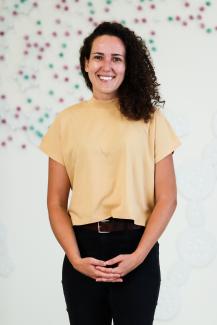
Dr. Vanessa Castro
Dr. Vanessa Castro is a specialist in materials science with a focus on polymers. She obtained her PhD in 2022 from UFSC (Brazil) with a project based on the development of conductive electrospun membranes for nerve regeneration. During the last year of her PhD, she participated in an exchange program at the Institute “Institut national des sciences appliquées de Lyon” (France) to invastigate the potential of bio-ionic liquids to increase membranes properties, such as biocompatibility. In 2023, she started her postdoc in the Green Functional Materials group. Her mission in the team is the development of green Pickering emulsions for multiple applications.
Research skills and interests: microstructural, mechanical and thermal characterizations (SEM, Tensile, DMA, DSC and TGA) and electrospinning.
E-Mail: vanessa [dot] oliveira-castro [at] esm [dot] tu-freiberg
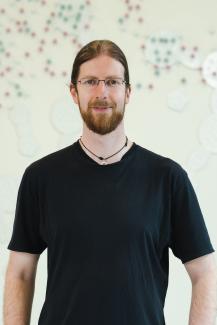
M. Sc. Hans Lesny
M.Sc. Hans Lesny studied Applied Natural Science at TUBAF which gave him a deep and interdisciplinary understanding of chemical, physical, and biological principles. While working as a research assistant on various projects, he was also able to acquire specific technical knowledge in the fields of sensor technology and materials science. In February 2023, he started his PhD on "Fabrication and characterization of bio nanoparticles for reactive membranes" in the Green Functional Materials group.
Research skills and interests: biobased polymers and colloids, metal nanoparticles, chemical sensors, XPS, QCM
E-Mail: hans [dot] lesny [at] esm [dot] tu-freiberg [dot] de
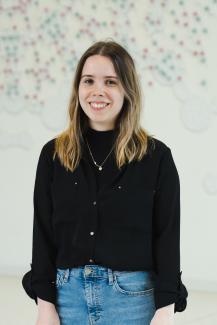
Dipl. Ing. Laura Hohlfeld
Laura Hohlfeld received her Diploma in Nanotechnology (TUBAF) in July 2023. She joint the group as PhD student in August 2023. Her work is funded by an ESF-PhD grant from the European Union and aims at structuring stimuli-responsive biopolymers for the application in smart membranes.
Research skills and interests: thermoresponsive biopolymers, methylcellulose, Pickering emulsions
E-Mail: laura [dot] hohlfeld [at] student [dot] tu-freiberg [dot] de
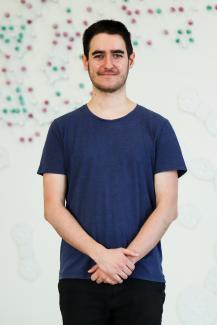
Dipl. Ing. Leon Nowack
Leon Nowack is specialized in nanomaterial research and biopolymer chemistry. He received his Diploma in Nanotechnology from TUBAF in August 2023 for his work on the oxidation of cellulosic nanomaterials. In the same year he started his PhD in team of Katja Heise where he is working on the design of sustainable catalytic materials. His PhD work is funded by an ESF-grant from the European Union.
Research skills and interests: biopolymers, chemical modification, structural and functional characterization, biosensor design, catalysis
E-Mail: leon [dot] nowack [at] esm [dot] tu-freiberg [dot] de
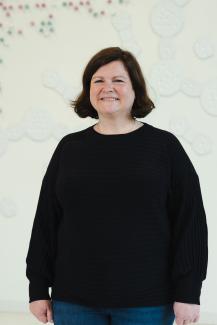
Kristin Lehmann
As lab technician, Kristin Lehmann is responsible for the isolation and characterization of biobased nanomaterials.
E-Mail: kristin [dot] lehmann [at] esm [dot] tu-freiberg [dot] de
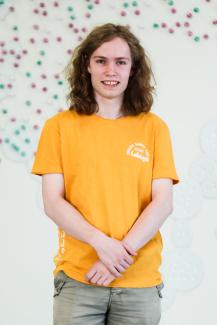
Bastian Zötzl
Bastian Zötzl is a Diploma nanotechnology student at TUBAF since 2021. He is working as a student assistant in the team and is mainly responsible for building membrane test systems. His interests also lie in the electrospinning of green emulsions.
Research skills and interests: electrospinning, nanocellulose, programming and coding of Arduino-supported research devices.
E-Mail: bastian-gabriel [dot] zoetzl [at] student [dot] tu-freiberg [dot] de
Student projects and Open Positions
We always have exciting topics for student porjects and we are happy about new faces and expertises in our team! If you would like to work with us, just send an email to: katja [dot] heise [at] esm [dot] tu-freiberg [dot] de
Be fast and contact us!
From January 2025 we are searching for a highly motivated Process Engineer who wants to pursue a PhD in our Filtrolution project. You will contribute to integrating biobased membranes into modules, processes and, finally, the application in water treatment, catalysis and drug delivery.
Hard facts: 3 year position (1/25-12/27), E13 (75%)
For more info send an email to: katja [dot] heise [at] esm [dot] tu-freiberg [dot] de (katja[dot]heise[at]esm[dot]tu-freiberg[dot]de)